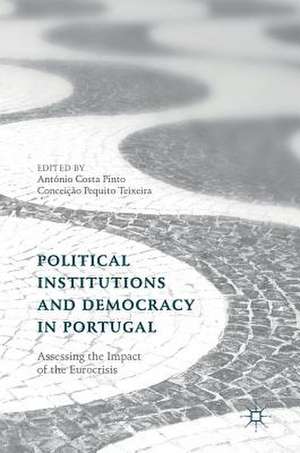Political Institutions and Democracy in Portugal: Assessing the Impact of the Eurocrisis
Editat de António Costa Pinto, Conceição Pequito Teixeiraen Limba Engleză Hardback – 23 ian 2019
Preț: 646.43 lei
Preț vechi: 760.50 lei
-15% Nou
Puncte Express: 970
Preț estimativ în valută:
123.69€ • 129.49$ • 102.35£
123.69€ • 129.49$ • 102.35£
Carte tipărită la comandă
Livrare economică 05-19 aprilie
Preluare comenzi: 021 569.72.76
Specificații
ISBN-13: 9783319981512
ISBN-10: 331998151X
Pagini: 249
Ilustrații: XIII, 253 p. 9 illus., 3 illus. in color.
Dimensiuni: 148 x 210 mm
Greutate: 0.59 kg
Ediția:1st ed. 2019
Editura: Springer International Publishing
Colecția Palgrave Macmillan
Locul publicării:Cham, Switzerland
ISBN-10: 331998151X
Pagini: 249
Ilustrații: XIII, 253 p. 9 illus., 3 illus. in color.
Dimensiuni: 148 x 210 mm
Greutate: 0.59 kg
Ediția:1st ed. 2019
Editura: Springer International Publishing
Colecția Palgrave Macmillan
Locul publicării:Cham, Switzerland
Cuprins
1. Portugal before and after the “Great Recession”. A resiliente Democracy?.- 2 The Political Economy of Portuguese Crisis Years: The Road not Taken.- 3. The President of the Republic and the Management of the Eurocrisis.- 4. Electoral Systems and Political Reforms: Portugal in Comparative Perspective.- 5. The Portuguese Party System: Evolution in Continuity?.- 6. The Centrality of the Portuguese Parliament: Reform, Troika and “Contraption”.- 7. The Portuguese Constitutional Court and its Austerity Case Law.- 8. New challenges, Old Parties: Party Change in Portugal after the European crisis.- 9. Trade Union Representation and Industrial Relations in Portugal before, during and following the Economic and Financial Crises.- 10. Portugal and Spain in the international protest cycles: from global justice movement to anti-austerity protests.- 11. Political Discontentment and “Democrats with Adjectives” in Portugal post-Troika: Risks and Opportunities.
Notă biografică
António Costa Pinto is Research Professor at the Institute of Social Sciences, University of Lisbon, Portugal. He has published on authoritarianism, political elites, democratization and transitional justice. He co-edited several volumes for Palgrave, namely, Rethinking Fascism and Dictatorship in Europe (2014) (with A. Kallis) and Technocratic Ministers and Political Leadership in European Democracies (2018) (with M. Cotta and P. Tavares de Almeida).
Conceição Pequito Teixeira is Assistant Professor at the Institute of Social and Political Sciences, University of Lisbon, Portugal. Her research interests currently focus is on comparative politics, parties and systems of political parties, political representation and electoral systems, political institutions and political attitudes and behaviour. Her most recent publications are Social Capital, Social Economy and Quality of Democracy in Portugal (2015) and contributions to the journals South European Society and Politics and Party Politics.
Conceição Pequito Teixeira is Assistant Professor at the Institute of Social and Political Sciences, University of Lisbon, Portugal. Her research interests currently focus is on comparative politics, parties and systems of political parties, political representation and electoral systems, political institutions and political attitudes and behaviour. Her most recent publications are Social Capital, Social Economy and Quality of Democracy in Portugal (2015) and contributions to the journals South European Society and Politics and Party Politics.
Textul de pe ultima copertă
This book examines how patterns of political representation, party system, and political culture have changed in Southern Europe following the “Great Recession” of 2008. It draws on the experience of Portugal to argue that austerity measures have significantly deepened the legitimacy crisis of democratic institutions, but the resilience of party system is remarkable in comparison. The case of Portugal present some interesting differences from other southern European democracies, since on one hand it suffered a deep economic crisis and the consequent bailout from the International Monetary Fund, the European Central Bank and the European Union, but on the other hand the party system remained stable. Nevertheless the impact of the crisis did reinforce a centre-periphery cleavage within the European Union, and especially in the Eurozone, Portugal is a central element of this new cleavage notoriously aggravated by the Brexit.
Caracteristici
Considers the causes and conditions that explain the development of the modern Portuguese political system Analyses the basic characteristics of Portugal's current democracy Offers an invaluable context to the comparative study of populist challenges in European democracies
